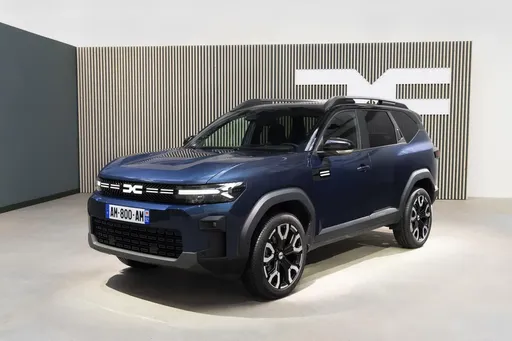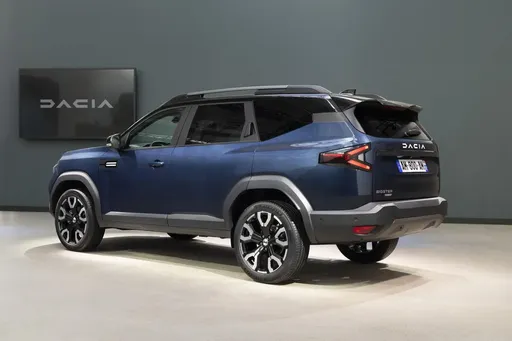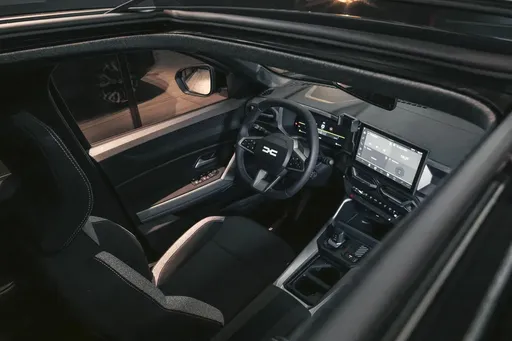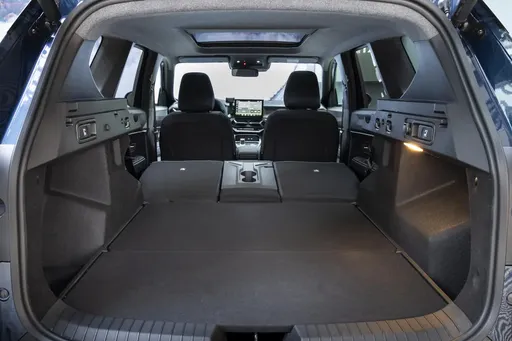The automotive landscape is rapidly evolving, offering consumers more choices than ever in the SUV segment. Among the contenders, the Volkswagen Tiguan and Dacia Bigster stand out for their distinct appeal, price points, and features. In this article, we delve into a comprehensive comparison of these two popular models, focusing on their technical aspects and innovations.
VW Tiguan vs Dacia Bigster – Który model sprawdza się lepiej na co dzień?
Dwa auta, jedno starcie: VW Tiguan kontra Dacia Bigster.
Które wypada lepiej pod względem osiągów, zużycia i relacji ceny do jakości? Sprawdź teraz!
Design and Dimensions
The VW Tiguan has a length of 4539 mm and a width of 1842 mm, while the Dacia Bigster slightly edges ahead in size at 4570 mm long and 1813 mm wide. Both SUVs are designed with a modern aesthetic, but the Tiguan leans towards a more polished finish, reflecting Volkswagen's premium branding. The height of the Tiguan is 1658 mm, whereas the Bigster stands a bit taller at 1705 mm, offering a commanding view of the road.
Performance and Powertrains
Under the hood, the VW Tiguan offers a range of engine options, including petrol hybrid, plug-in hybrids, and diesel engines, with power outputs varying from 130 HP to a robust 272 HP. The Dacia Bigster, though more limited in variety, offers power outputs ranging from 130 HP to 155 HP. The Tiguan also features more advanced powertrains, like its petrol MHEV and diesel options, ensuring flexible performance across various driving conditions.
Transmission Types
The Tiguan comes equipped exclusively with automatic dual-clutch transmissions, enhancing driving experience with quick gear changes. Conversely, the Bigster provides both manual and automated transmission options, catering to those who prefer more control over their driving experience.
Fuel Efficiency and Emissions
When it comes to fuel consumption, the Tiguan's impressive efficiency ranges from 5.3 to 8.5 L/100 km depending on the engine variant, while the Bigster presents numbers between 4.7 to 6.1 L/100 km. Emission standards are also notable, with the Tiguan fitting into a CO2 efficiency class ranging from E to B, while the Bigster boasts a slightly better class, achieving from E to C. This makes the Bigster a more environmentally friendly option.
Space and Practicality
Both SUVs comfortably seat five passengers. Trunk capacity also plays a vital role in practicality; the Tiguan offers a generous 652 L, compared to the Bigster's 550 to 667 L, depending on the configuration. For those who prioritize cargo space, the Tiguan may hold a slight edge, yet the Bigster’s configuration still provides ample storage for everyday needs.
Safety and Technology
In terms of safety features, both vehicles are equipped with modern technologies such as multiple airbags, traction control, and stability support. Volkswagen's commitment to safety is eminent with the Tiguan, often securing top ratings in global safety tests. Technology-wise, the Tiguan dominates with a higher level of infotainment and driver-assistance systems, which include adaptive cruise control and lane-keeping assistance, giving it a tech-savvy edge over the Bigster.
Innovative Features
The VW Tiguan’s innovation spectrum includes a sophisticated digital cockpit and various connectivity options that enhance the overall driving experience. The Dacia Bigster, while not as tech-heavy, offers practical innovations like modular storage solutions, emphasizing functionality rather than high-end features.
Conclusion: The Right Choice for You
In conclusion, both the VW Tiguan and Dacia Bigster present appealing options within the SUV market. The Tiguan excels in performance, technology, and luxury, making it suitable for those who seek a premium driving experience. On the other hand, the Bigster leverages practicality and a more budget-friendly approach, appealing to buyers who prioritize value without compromising essential features. Ultimately, the choice hinges on individual preferences, making it crucial for potential buyers to assess their needs and lifestyles when embarking on their SUV journey.
Szczegóły techniczne: konkretne różnice między modelami
Koszty i zużycie
Cena i efektywność to kluczowe czynniki przy zakupie auta – właśnie tu często widać największe kontrasty.
Dacia Bigster ma decydowany przewagę cenową – jego cena zaczyna się od 105400 zł, podczas gdy VW Tiguan kosztuje 168000 zł. Różnica wynosi około 62642 zł.
W spalaniu również widać różnice: VW Tiguan zużywa 1.40 L i jest tym samym znaczący oszczędniejszy niż Dacia Bigster, który spala 4.70 L. To około 3.30 L różnicy na 100 km.
Silnik i osiągi
Moc, moment i przyspieszenie to klasyczne parametry, na których skupiają się entuzjaści – tu widać ciekawe różnice.
Pod względem mocy silnika VW Tiguan ma znaczący przewagę – 272 KM zamiast 155 KM. To różnica około 117 KM KM.
W przyspieszeniu 0–100 km/h VW Tiguan jest przekonujący szybszy – 5.90 s wobec 9.70 s. Różnica wynosi około 3.80 s sekundy.
Pod względem prędkości maksymalnej VW Tiguan jest zauważalny lepszy – osiąga 242 km/h, podczas gdy Dacia Bigster kończy na 180 km/h. Różnica to około 62 km/h.
Różnica widoczna jest również w momencie obrotowym: VW Tiguan ciągnie decydowany mocniej – 400 Nm wobec 230 Nm. Różnica to około 170 Nm.
Przestrzeń i praktyczność
Wnętrze, bagażnik i ładowność mają kluczowe znaczenie w codziennym użytkowaniu. Liczy się komfort i elastyczność.
Oba samochody oferują miejsce dla 5 osób.
Pod względem masy własnej Dacia Bigster jest w niewielkim stopniu lżejszy – 1425 kg wobec 1599 kg. Różnica to około 174 kg kg.
Pod względem pojemności bagażnika Dacia Bigster oferuje prawie niezauważalny więcej miejsca – 667 L wobec 652 L. To różnica około 15 L litrów.
W maksymalnej pojemności ładunkowej Dacia Bigster wypada w niewielkim stopniu lepiej – do 1937 L, czyli o około 287 L więcej niż VW Tiguan.
Pod względem ładowności VW Tiguan wypada lekko lepiej – 533 kg wobec 467 kg. Różnica to około 66 kg kg.
Kto zostaje zwycięzcą?
Podsumowując, VW Tiguan jest przewyższa w niemal każdym aspekcie i zasługuje na tytuł DriveDuel Champion.
Oferuje lepszy, bardziej zrównoważony pakiet i jest praktyczniejszym towarzyszem na co dzień.
 @ Volkswagen AG / VW Media
@ Volkswagen AG / VW Media
VW Tiguan
VW Tiguan
Tiguan to pewny wybór dla rodziny, która ceni wygodę, solidne wykonanie i trochę miejskiego szyku bez przesadnej ekstrawagancji. Na drodze daje poczucie kontroli i klasy, a wnętrze potrafi być równie rozsądne, co przyjemne — idealny kompan do codziennej jazdy i weekendowych wypadów.
szczegóły @ Volkswagen AG / VW Media
@ Volkswagen AG / VW Media
 @ Volkswagen AG / VW Media
@ Volkswagen AG / VW Media
 @ Volkswagen AG / VW Media
@ Volkswagen AG / VW Media
 @ Volkswagen AG / VW Media
@ Volkswagen AG / VW Media
 @ Volkswagen AG / VW Media
@ Volkswagen AG / VW Media
 @ Volkswagen AG / VW Media
@ Volkswagen AG / VW Media
Dacia Bigster
Dacia Bigster to SUV, który stawia na praktyczność i rozsądek — prosty w obsłudze, przestronny i z charakterem, który nie udaje więcej niż jest wart. Dla osób szukających sensownego kompromisu między ceną a funkcjonalnością to solidna propozycja, która nie sili się na luksus, za to chętnie zabierze rodzinę i bagaże tam, gdzie trzeba.
szczegóły @ Dacia / Renault Group Media
@ Dacia / Renault Group Media
 @ Dacia / Renault Group Media
@ Dacia / Renault Group Media
 @ Dacia / Renault Group Media
@ Dacia / Renault Group Media
 @ Dacia / Renault Group Media
@ Dacia / Renault Group Media
 @ Dacia / Renault Group Media
@ Dacia / Renault Group Media
 @ Volkswagen AG / VW Media
@ Volkswagen AG / VW Media
|
 @ Dacia / Renault Group Media
@ Dacia / Renault Group Media
|
|
|
|
Koszty i Zużycie |
|
|---|---|
|
Cena
168000 - 265800 zł
|
Cena
105400 - 136100 zł
|
|
Zużycie L/100km
1.4 - 8.4 L
|
Zużycie L/100km
4.7 - 7.1 L
|
|
Zużycie kWh/100km
-
|
Zużycie kWh/100km
-
|
|
Zasięg elektryczny
118 - 126 km
|
Zasięg elektryczny
-
|
|
Pojemność baterii
19.70 kWh
|
Pojemność baterii
-
|
|
CO2
32 - 190 g/km
|
CO2
106 - 137 g/km
|
|
Pojemność zbiornika paliwa
45 - 58 L
|
Pojemność zbiornika paliwa
50 - 55 L
|
Wymiary i Nadwozie |
|
|---|---|
|
Typ nadwozia
SUV
|
Typ nadwozia
SUV
|
|
Miejsca siedzące
5
|
Miejsca siedzące
5
|
|
Drzwi
5
|
Drzwi
5
|
|
Masa własna
1599 - 1890 kg
|
Masa własna
1425 - 1547 kg
|
|
Pojemność bagażnika
490 - 652 L
|
Pojemność bagażnika
510 - 667 L
|
|
Długość
4539 mm
|
Długość
4570 mm
|
|
Szerokość
1842 - 1859 mm
|
Szerokość
1813 mm
|
|
Wysokość
1656 - 1658 mm
|
Wysokość
1705 mm
|
|
Maksymalna pojemność bagażnika
1486 - 1650 L
|
Maksymalna pojemność bagażnika
1813 - 1937 L
|
|
Ładowność
460 - 533 kg
|
Ładowność
383 - 467 kg
|
Silnik i Wydajność |
|
|---|---|
|
Typ silnika
Benzyna, Mild Hybrid Benzyna, Diesel, Hybryda Plug-in
|
Typ silnika
Mild Hybrid Benzyna, Pełna Hybryda, LPG
|
|
Skrzynia biegów
Automatyczna
|
Skrzynia biegów
Manuel, Automatyczna
|
|
Szczegóły skrzyni biegów
Automatyczna dwusprzęgłowa
|
Szczegóły skrzyni biegów
Manualna skrzynia biegów, Zautomatyzowana manualna
|
|
Rodzaj napędu
Napęd na cztery koła, Napęd na przednie koła
|
Rodzaj napędu
Napęd na cztery koła, Napęd na przednie koła
|
|
Moc KM
130 - 272 KM
|
Moc KM
130 - 155 KM
|
|
Przyspieszenie 0-100km/h
5.9 - 10.6 s
|
Przyspieszenie 0-100km/h
9.7 - 11.2 s
|
|
Maksymalna prędkość
198 - 242 km/h
|
Maksymalna prędkość
180 km/h
|
|
Moment obrotowy
220 - 400 Nm
|
Moment obrotowy
230 Nm
|
|
Liczba cylindrów
4
|
Liczba cylindrów
3 - 4
|
|
Moc kW
96 - 200 kW
|
Moc kW
96 - 115 kW
|
|
Pojemność silnika
1498 - 1984 cm3
|
Pojemność silnika
1199 - 1799 cm3
|
Ogólne |
|
|---|---|
|
Rok modelowy
2024 - 2025
|
Rok modelowy
2025
|
|
Klasa efektywności CO2
G, D, E, F, B
|
Klasa efektywności CO2
E, D, C
|
|
Marka
VW
|
Marka
Dacia
|
Jakie wersje napędu oferuje VW Tiguan?
Model oferowany jest z napędem Napęd na cztery koła albo Napęd na przednie koła.
Wyświetlane ceny i dane są szacunkowe, oparte na niemieckich cenach katalogowych i mogą się różnić w zależności od kraju. Te informacje nie stanowią wiążącej oferty.
